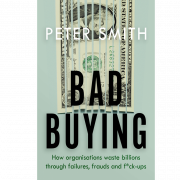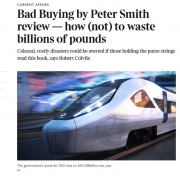Spotting the Dodgy Bidder
After a couple of weeks featuring the travails of the Chartered Institute of Procurement and Supply, let us return to the day-to-day world of Bad Buying.
Looking through a list of recent procurement-related frauds, there were the usual “fake invoice” incidents, still probably the most common way to extract money from an organisation. In most cases, it is an insider driving that, setting up fake companies and signing off payments themselves, but sometimes there may be external help too.
But then I spotted an interesting example of a type of fraud that is rarely reported. It involves a firm (or individual) submitting false information to a buyer and winning a contract on the basis of that information. Now we might ask whether it is unusual to see this because it rarely happens – or because the perpetrators just don’t get caught!
In this case, Raymond White (who has used several other names during his long and not particularly illustrious criminal career) defrauded the US government by “submitting fraudulent documents and false information about himself, his company’s business, and his company’s finances in order to obtain a $4.8 million contract to build a munitions load crew training facility at Joint Base Andrews, Maryland”.
He also obtained a bond guarantee from the United States Small Business Administration in connection with the same contract, and just for good measure, he committed identity theft by using another person’s signature and Social Security number (presumably to avoid using his own name, as he was a known criminal!)
For his company, Kochendorfer Group USA Inc., to bid for the contract he submitted fake bank statements, accounting firm reports from a “firm” he had invented, and false financial statements. They showed the firm had plenty of cash when really it had almost nothing. We shouldn’t laugh but some of it borders on the absurd – he also submitted a “false resume and firm dossier, which described fictitious construction jobs and provided fake references. White claimed, among other things, that he had overseen the construction of a World Cup soccer stadium in Brazil from 2012 to 2014 when in fact, he was in federal prison during that time frame, serving a prison term on a prior fraud conviction”.
I mean, if you’re going to lie, you might as well go big – not a local housing development but a World Cup stadium! Anyway, he won the contract but fortunately, the client (the National Guard) discovered the fraud before any work actually took place. White pleaded guilty, not surprisingly, and he will be sentenced in May.
If you are reading this and thinking, “this couldn’t happen here”, then presumably you always check financial statements and take up supplier references, whether that is talking to another customer of the firm involved or indeed an employer or client if it is an individual contractor. Well done. But it doesn’t always happen.
A few years ago, I advised a firm that was challenging a procurement decision made by a very large UK government central department. Basically, another bidder had told lies in their bid and had won the contract. That bidder had provided a reference that would have exposed a lie – IF the Department has taken up that reference. There were other aspects of the bid that were dodgy and would have been exposed if the buyer had made a call or two. For instance, the bidder claimed that they were strong in certain regions of the UK when they clearly weren’t
When my client challenged this, the Department had an interesting response. They said that they were not required by procurement regulations to pursue references, or indeed that they had any obligation to check that anything a bidder said in their proposal was accurate and true! Now technically that might be correct, but we suggested to the Department that a judge might well make the assumption that a reasonably competent buyer had a duty to do some basic work around bid veracity! The Department went away to think about it, no doubt consulted their lawyers… and then re-ran the competition.
Obviously, buyers don’t always have time to check out every single detail of a bid and all the surrounding information and intelligence about the potential suppliers. But we are responsible for at least assuring ourselves that when someone claims to have built a football stadium in Brazil, they actually did, rather than being in jail at that time.









Leave a Reply
Want to join the discussion?Feel free to contribute!